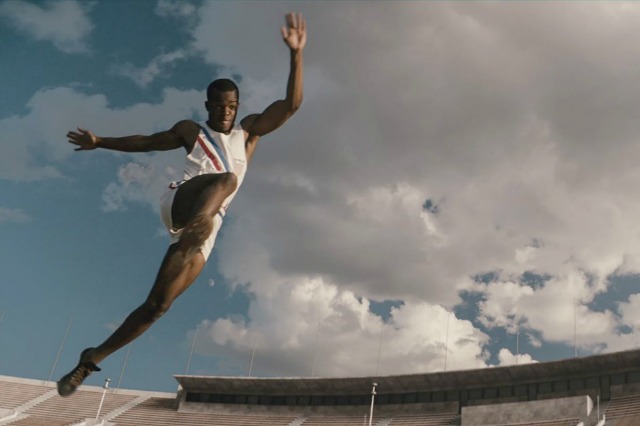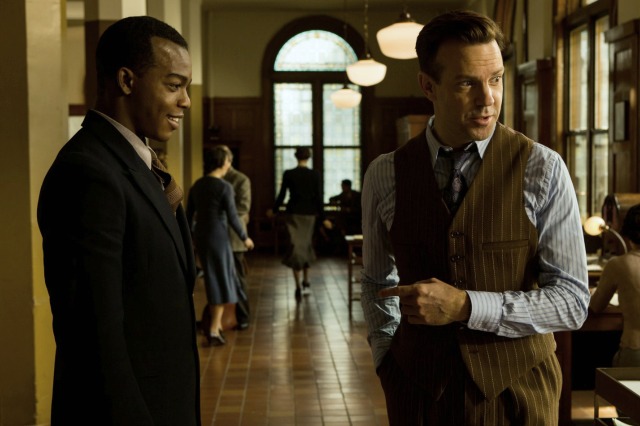Inspirational Scenes Redeem The Occasional Clumsy Cliché In 'Race'
By Joel Wicklund in Arts & Entertainment on Feb 18, 2016 6:38PM

Stephan James as Jesse Owens in "Race." (Photo: © Focus Features, 2015.)
The Jesse Owens story, as told by the director of Predator 2, Lost in Space and The Reaping.
This was not a promising pairing of subject matter and filmmaker.
Expectations undoubtedly affect your experience of a movie, so maybe my judgment was distorted by not-so-high hopes for the Owens biopic, Race—but what looked like a probable disaster is actually a modest pleasure. Race has plenty of problems, including an abundance of clichés, a few historical inaccuracies and director Stephen Hopkins' advertising-slick style. But I'll be damned if I wasn't moved a few times.
The true story of Jesse Owens is pretty solid material for an inspirational film. As a four-time gold medalist at the 1936 Berlin Olympics, his victories were a powerful rebuttal to Hitler's proclamation of Aryan supremacy. Just to get to that international stage, Owens had to overcome the systemic racism of a largely segregated U.S.A.
The movie smartly avoids the cradle-to-grave timeline some film biographies attempt, focusing on his years as a student athlete at Ohio State University, his training for the Olympics and, of course, his triumphs there. The central relationship in the film is between Owens, played artfully by Stephan James (Selma), and his college track coach Larry Snyder, portrayed by Jason Sudeikis, who shows dramatic chops in one of his first departures from comedy.
Race shows some lack of homework on the filmmakers' part early on, with a sportscaster heard slamming Snyder's career struggles at OSU. The snippet sounds nothing like radio broadcasts of the era and is closer to the "rile up the fans" tone of modern sports talk shows.
A far more serious misstep comes later, with the depiction of German filmmaker Leni Riefenstahl. Though an indisputably important film artist, Riefenstahl's main legacy is propaganda that helped the Nazis maintain the German public's support. Race glosses over Triumph of the Will as if it were merely an audition reel for Olympiad (her documentary on the Berlin games) instead of the most notorious pro-Fascist movie in history. Riefenstahl, who claimed naiveté about the Nazis during her long remaining years, would have loved that Race shows her as a glamorous proto-feminist instead of callous collaborator—but she was both.

Stephan James and Jason Sudeikis in "Race." (Photo: © Focus Features, 2015.)
Though less egregious, the portrayal of Hitler's Minister of Propaganda, Joseph Goebbels, reeks of movie-made villainy instead of the real world horrors he helped engineer. Ominous soundtrack tones play when he appears onscreen as a largely silent, sinister presence. It's a cheesy motif, considering the immense scope of his crimes against humanity.
Yet, even with such bungles, Race manages to provide the intended uplift. The screenplay by Joe Shrapnel and Anna Waterhouse accomplishes this without diminishing the long, hard and ongoing fight for civil rights that came after the '36 games. I won't spoil it, but a closing scene at an event honoring Owens does not go in the expected direction, where official recognition makes everything A-OK (see the horrible Oscar-night ending of Richard Attenborough's Chaplin for a prime example). Instead the film ends with both a troubling reflection of the segregated reality and a note of hope in the same scene.
Also lifting the movie above its formulaic elements is Andrew Moodie's performance as Owens' father, a man beaten down by long-term unemployment and depression. It's a small role, but Moodie does a lot with it, especially in a scene where an NAACP representative tries to convince the younger Owens to lead a boycott of the Olympics in protest of the treatment of black people at home as well as in Germany. Moodie provides a moment of stirring yet sad pride as the father tells the son to go if he wants to, because he believes his decision won't change things in either country but might change things for Owens.
David Kross (The Reader) also shines as Carl "Luz" Long, Owens' German competitor in the long jump. Long's act of good sportsmanship—moving a marker to help Owens qualify for the medal round—and his overt friendliness to his rival in the face of his government's disapproval has made him perhaps the most beloved silver medalist in history. Kross brings him to the screen with the appropriate likability, as well as a touch of anguish over his country's path. Jeremy Irons and William Hurt also gussy up some perfunctory supporting roles with their usual skill.
Race isn't a film for the ages, but it serves its important historical source well enough to get a pass. The landmark achievements of Jesse Owens may deserve a more masterful dramatization, but his legacy won't be tarnished by this efficient if minor salute.
Race. Directed by Stephen Hopkins. Written by Joe Shrapnel and Anna Waterhouse. Starring Stephan James, Jason Sudeikis, David Kross, Jeremy Irons, William Hurt and Andrew Moodie. 134 mins. Rated PG-13.
Opens Friday, Feb. 19 at theaters nationwide, with early screenings at select theaters tonight.